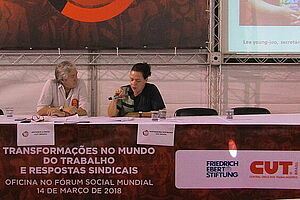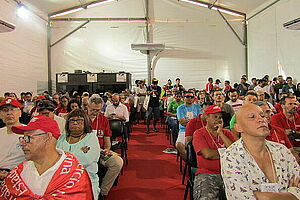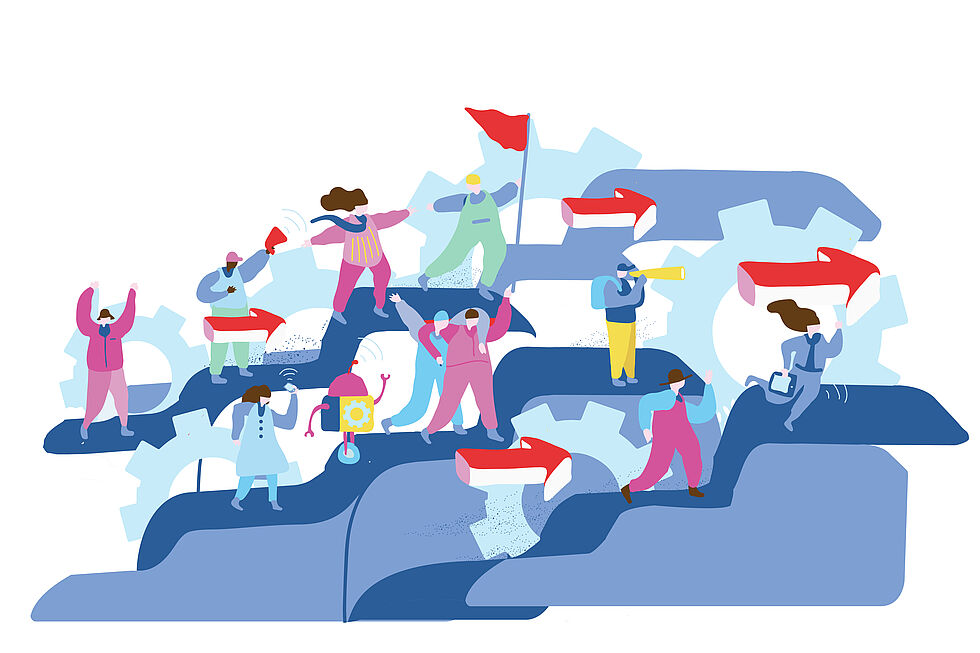Trade union responses to changes in the workplace
Read this article in Spanish.
On March 14, 2018, during the World Social Forum in Salvador, the Friedrich-Ebert-Stiftung (FES) and Brazil’s Unified Workers’ Central (Central Única dos Trabalhadores, or CUT) held a seminar on the impact of new technology in the workplace, and trade unions’ responses to the new dynamics of capital. The seminar was organized into three round tables of union representatives and experts from several countries.
Opening the seminar, CUT Secretary of International Relations Antonio Lisboa and Friedrich-Ebert-Stiftung Brazil Deputy Representative Katharina Hofmann highlighted the importance of this discussion, given the injustices that workers around the world and particularly in Brazil are currently enduring, with the blow to democracy and labour reform.
The first discussion session was titled “Control of Capital in the Scientific and Technological Revolution, and Impacts on the Workplace”. Participants included Global Trade Union Confederation President João Felício, DIEESE (Interunion Department of Statistics and Socioeconomic Studies) economist and technical supervisor Ana Georgina Dias, and Uruguayan economist Alma Espino.
In the second session, Marcio Pochmann of Perseu Abramo Foundation, Valter Sanches of Industriall (an international trade union federation of industrial workers) and Camilo Rubiano of PSI (Public Services International) discussed the impact of the scientific and technological revolution on services and industry.
In the third and final session, the challenges that the new configuration of capitalism and work present to trade union organization were discussed. Rafael Lamas of FGTB (General Federation of Belgian Labour), Victor Baez of the Trade Union Confederation of the Americas, and Fausto Durante of CGIL (Italian General Confederation of Labour) addressed the need to reorganize the trade union movement in light of digitalization, automation and the Industry 4.0 revolution.
Reduction in the number of workers in the workplace, unemployment and the individualization of the employer-employee relationship are among the challenges posed by the new reality.
The seminar involved the significant participation of trade union representatives and social movements, who raised the need to further deepen this discussion.
The panellists and the audience that filled the stands from CUT brought up important elements to be considered in the discussion on the future of work and trade union organization. One challenge that was highlighted was how to organize informal and temporary workers, who currently are mostly under individualized contracts. Their conditions typically lack references such as a set workplace or working day, and they suffer from reduced rights, including obstacles to organizing and negotiating collectively.
There are many challenges posed by this new reality. Among them are the reduction in the number of workers in the workplace, unemployment and the individualization of the employer-employee relationship. Today's worker does not need to leave home to work and sometimes provides services to several businesses. Various roles are disappearing in the fourth industrial revolution.
In the third social revolution, there was still a welfare state, and tripartism worked. The State had more political force and the government returned the investment from the citizens’ taxes in the form of quality services. In the fourth revolution, tripartism and the welfare state collapsed. Protective labour legislation was dismantled in most countries. With digitalization came a reduction in jobs and the withdrawal of rights. There will not be jobs for all.
Another important point raised was the need to construct a new societal ideal based on the interests of the working class in the face of the worsening class struggle. In this context, it is vital to have a political argument for a strong State that guarantees social protection, instigates growth and distributes wealth fairly.
We refuse to accept the view […] that the worker must adapt to the reality of deregulation and loosening of labour relationships.
It is no longer possible for the trade union movement to fight alone. Trade unions must move beyond short-term, immediate demands, limited to specific categories of organization or sectors of employment. Coordinated action with social movements is imperative to fight against the erosion of workers’ rights.
We refuse to accept the view, apparently held by some international bodies, that the worker must adapt to the reality of deregulation and loosening of labour relationships. The working class has new dreams, and organizing new forms of struggle is required: If trade unions and the left do not do this, new organizations will. This movement makes room for a new organization. It is necessary to understand what is happening and construct a defined agenda with these workers.
The new organization of capital through transnational corporations requires the trade union movement to move forward in its international organization. Productive reorganization is nothing new. What is new is the speed at which it is happening and the extreme concentration of wealth. All this restructuring is concentrated in the hands of the multinational corporations. Special attention must be paid to countries that have not completed the cycle of prior revolutions and are subject to very precarious conditions, such as India. Trade unions must be younger, more female and organized internationally. They must use new technologies for worker organization.
It cannot be said that there is no possibility for trade union action in the platform working groups and in the new conception of industry. On the contrary, it is necessary to refute the paradigm that worker organization is futile in the 21st Century. Young people who work on digital platforms tell us this is not true. They are beginning to organize by using cell phones, the same cell phones they use to work. If the workers are convinced, they can do it!
If the trade union movement does not pay special attention to the situation of the working woman, inequalities are likely to increase.
The debate on gender inequalities is also relevant. If the trade union movement does not pay special attention to the situation of the working woman, inequalities are likely to increase. Women display better indicators than men in terms of training. However, their better education and technological automation do not translate into equality in working conditions and pay. Although social movements have gaps, women’s organizations are surviving around the world. In many countries, women have had the highest expression of resistance and struggle. These organizations can be key to securing the autonomy of the working class.
The seminar was fruitful and raised important questions. Some questions, however, remained unanswered, highlighting the need to pursue a broad discussion process on the future of work. How can union membership and collective bargaining be guaranteed given this new reality? Are national trade unions in a position to cede some of their power in order to enable transnational negotiation? And what about the issue of economic solidarity? Can we envisage the models and tools to build a new, alternative socioeconomic and political model? These and other issues require a collective effort of strategy and action. Discussion and construction should be unceasing, and CUT and FES are committed to this. ###
The text was translated from Spanish into English and formatted for style. For more information on the trade union activities in Brazil, contact the country office of Freidrich-Ebert-Stiftung in the country.
About FES Connect
Connecting people, in the spirit of social democracy, we source and share content in English from the German and international network of the Friedrich-Ebert-Stiftung.



